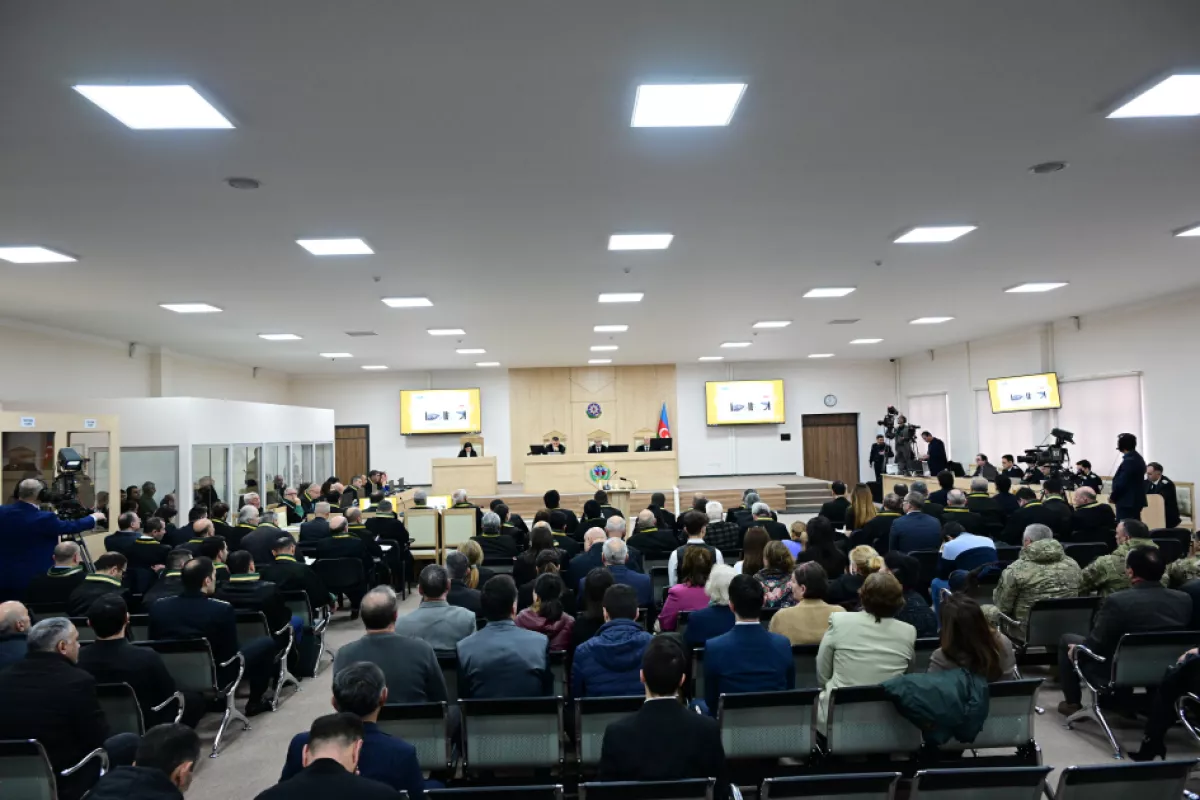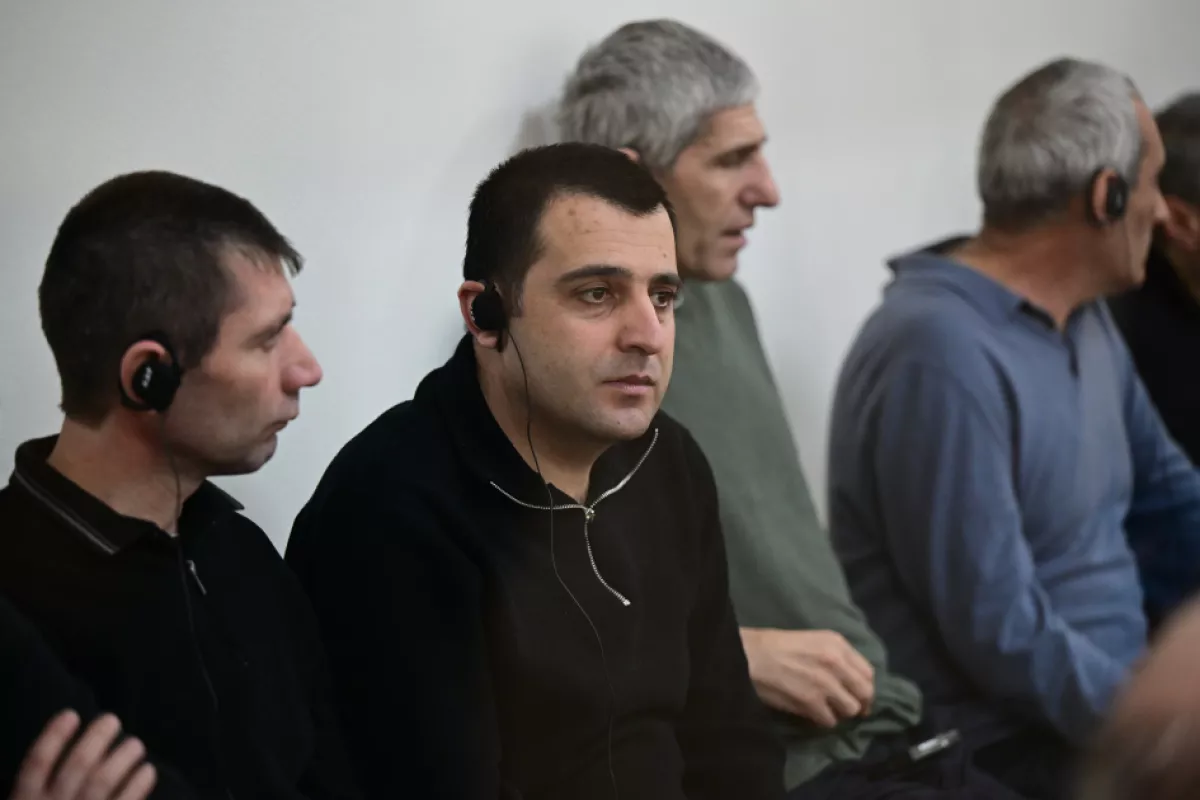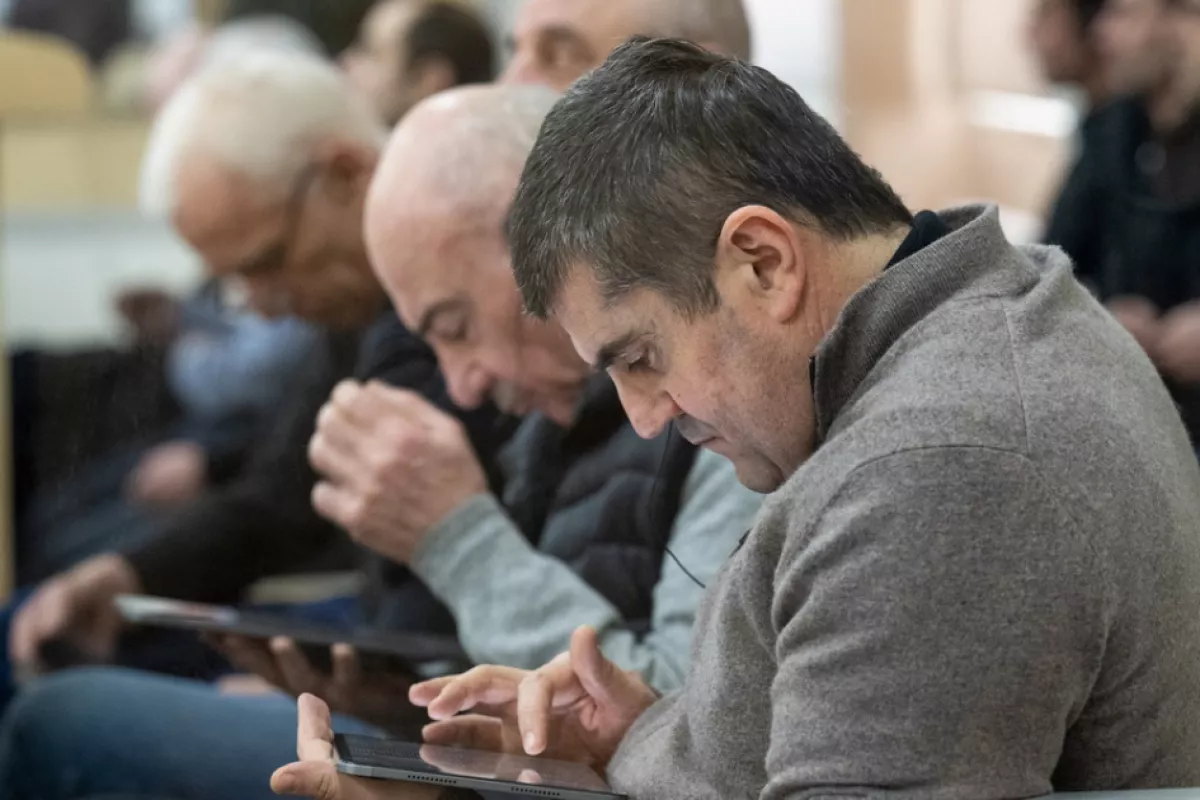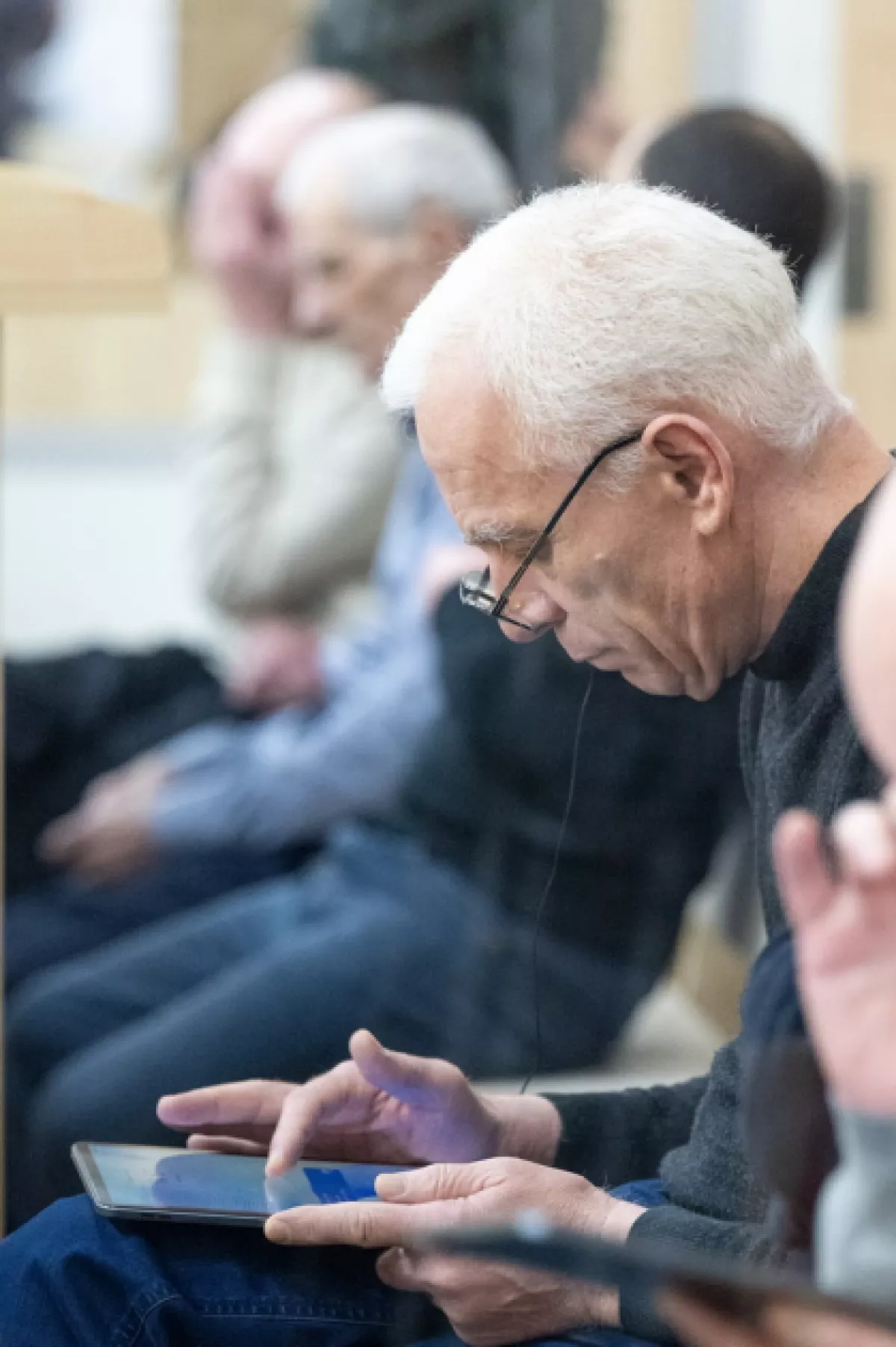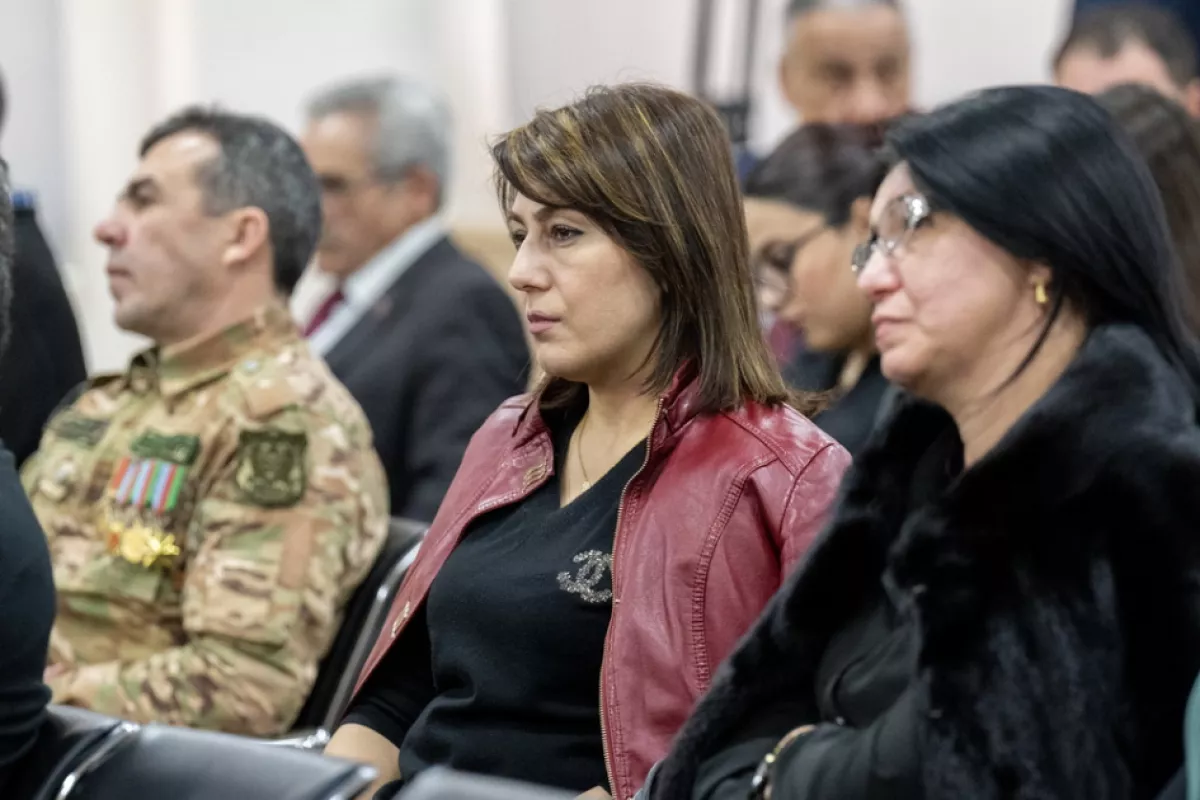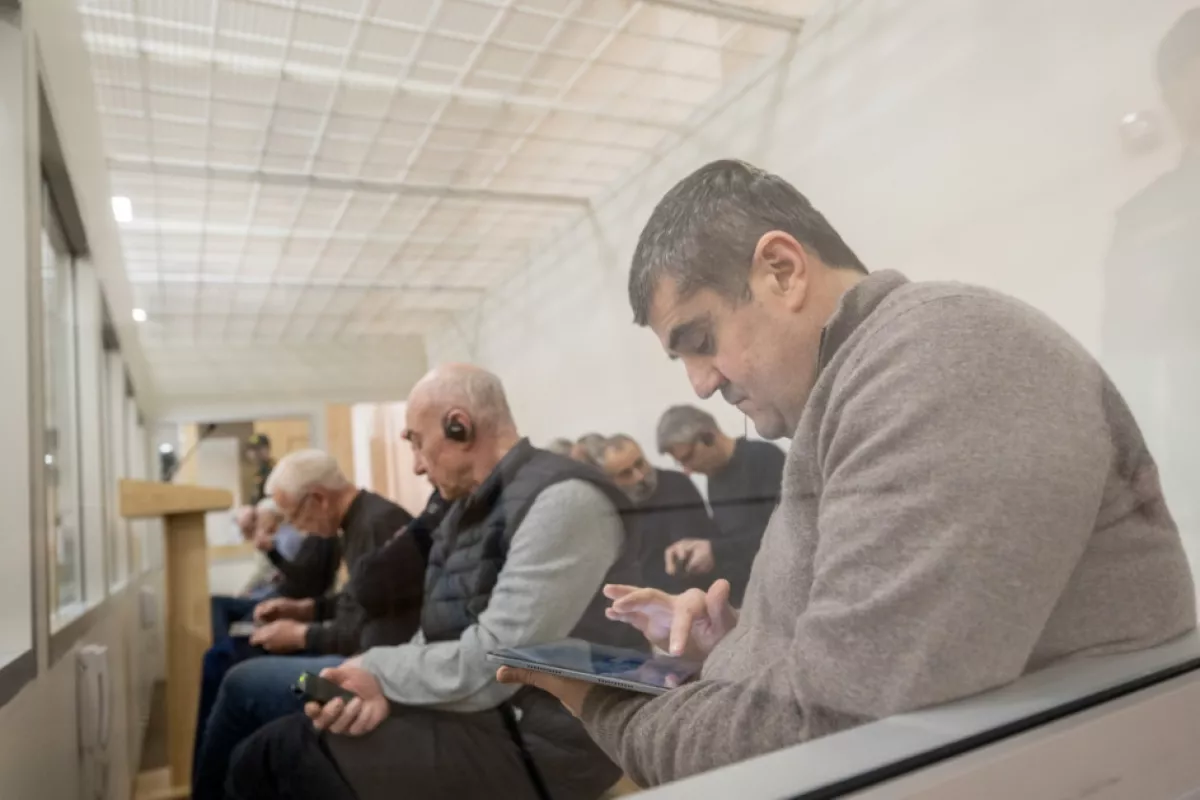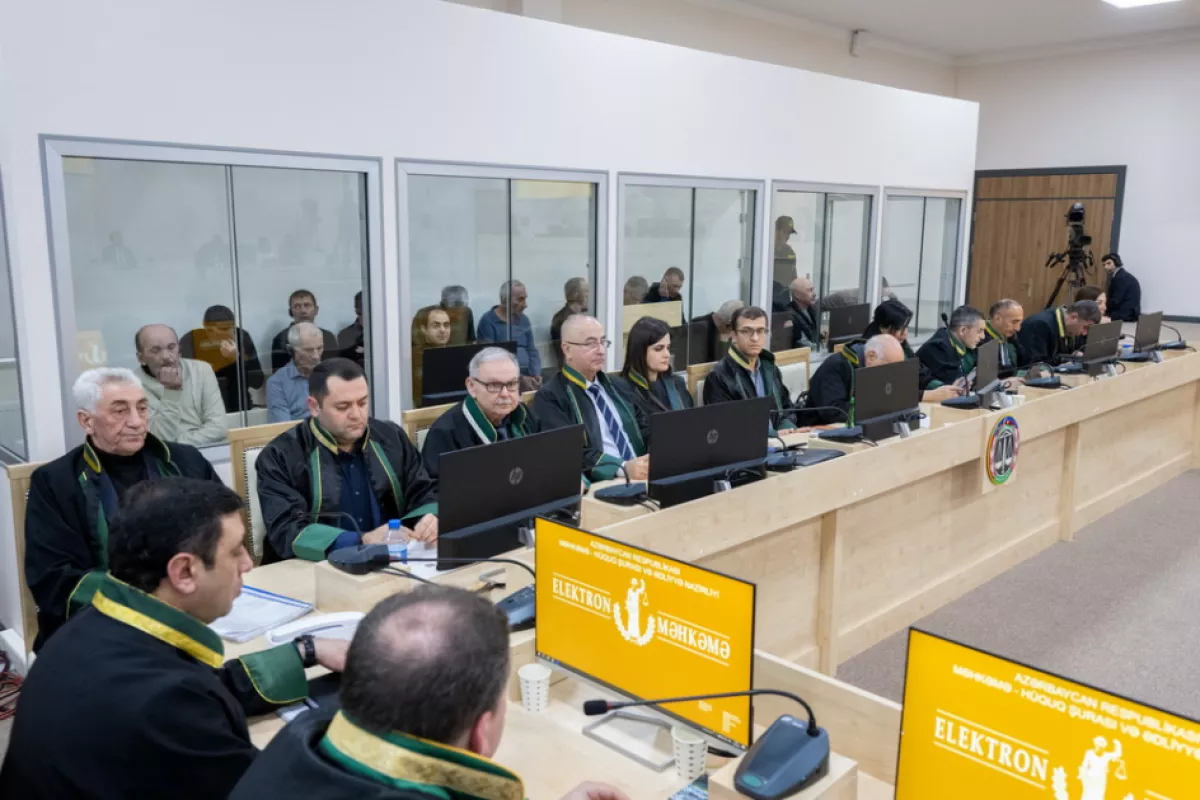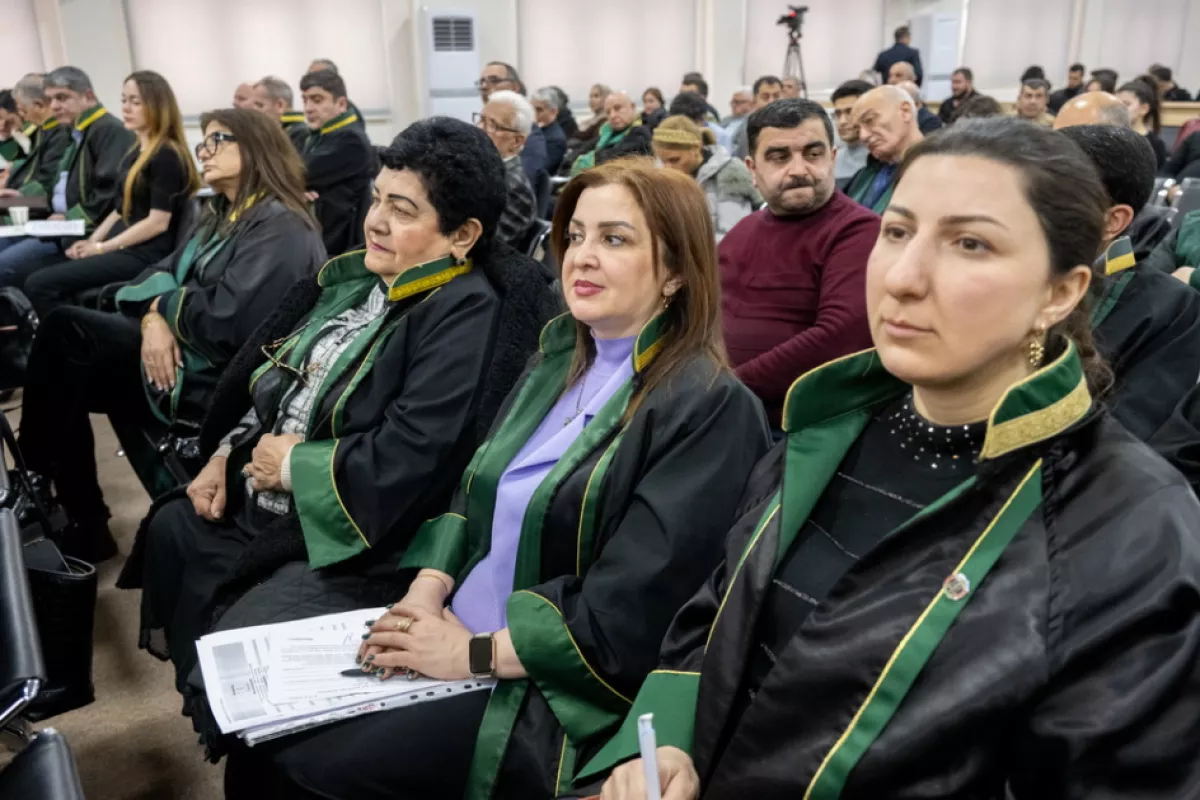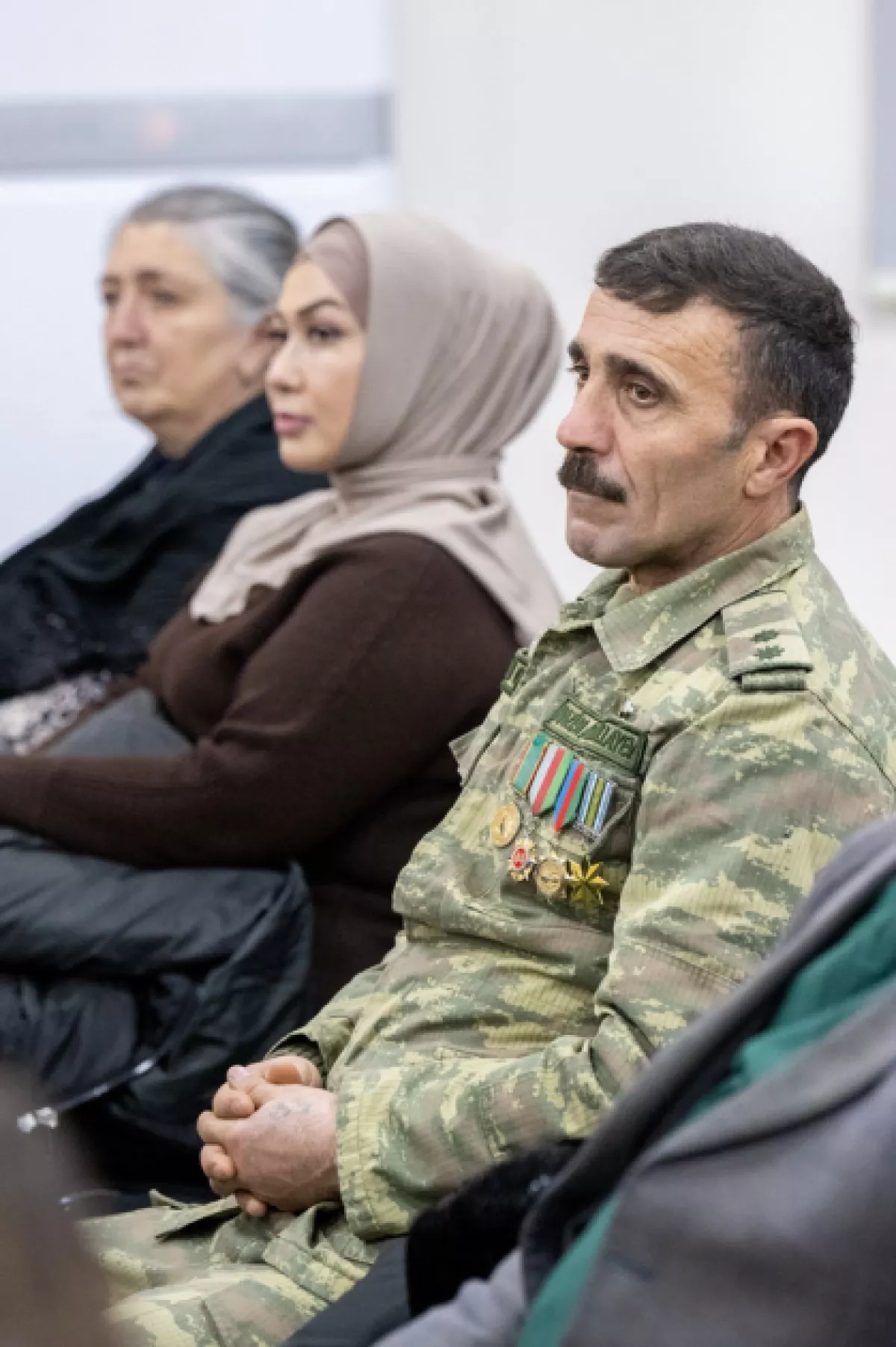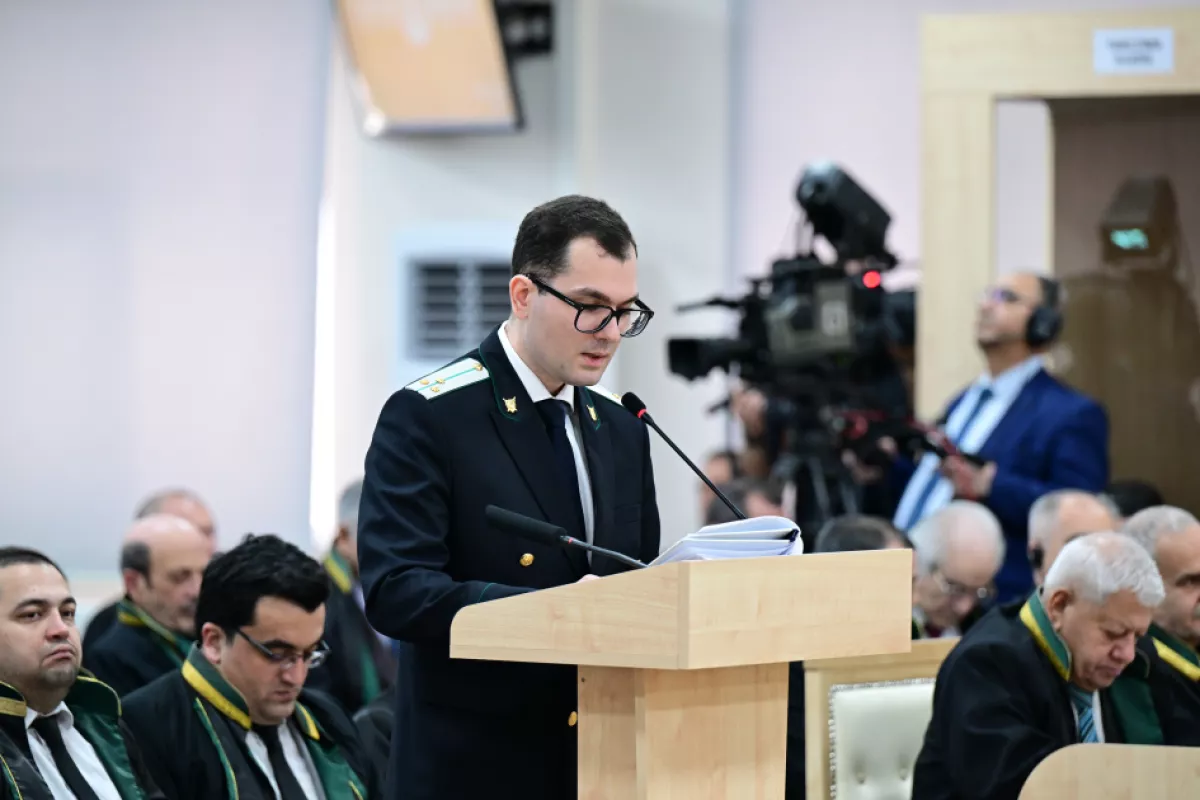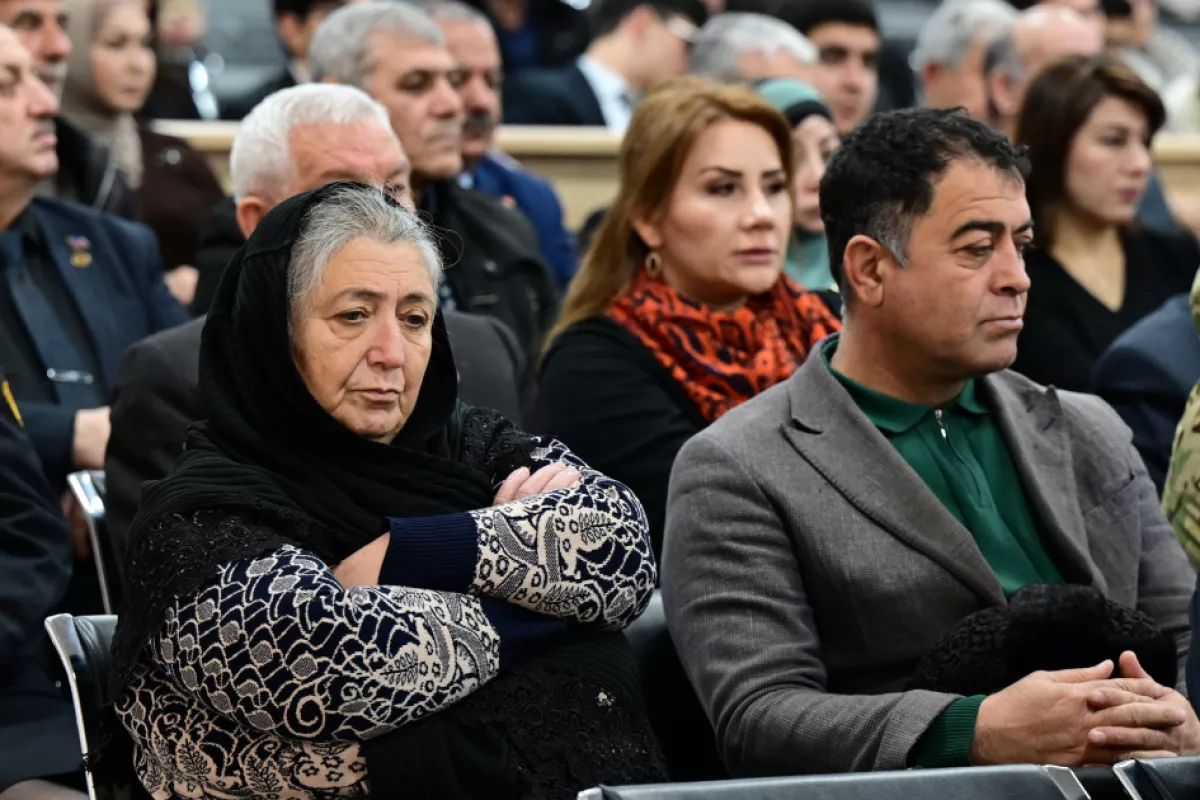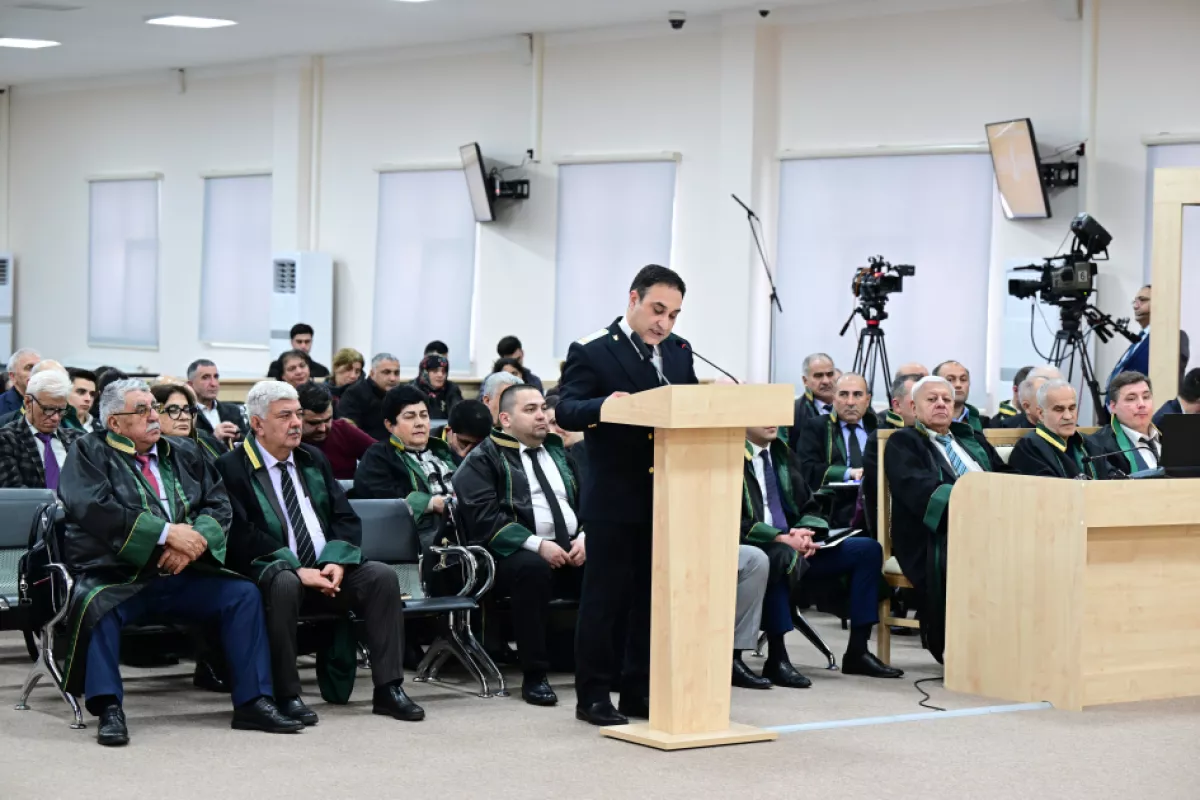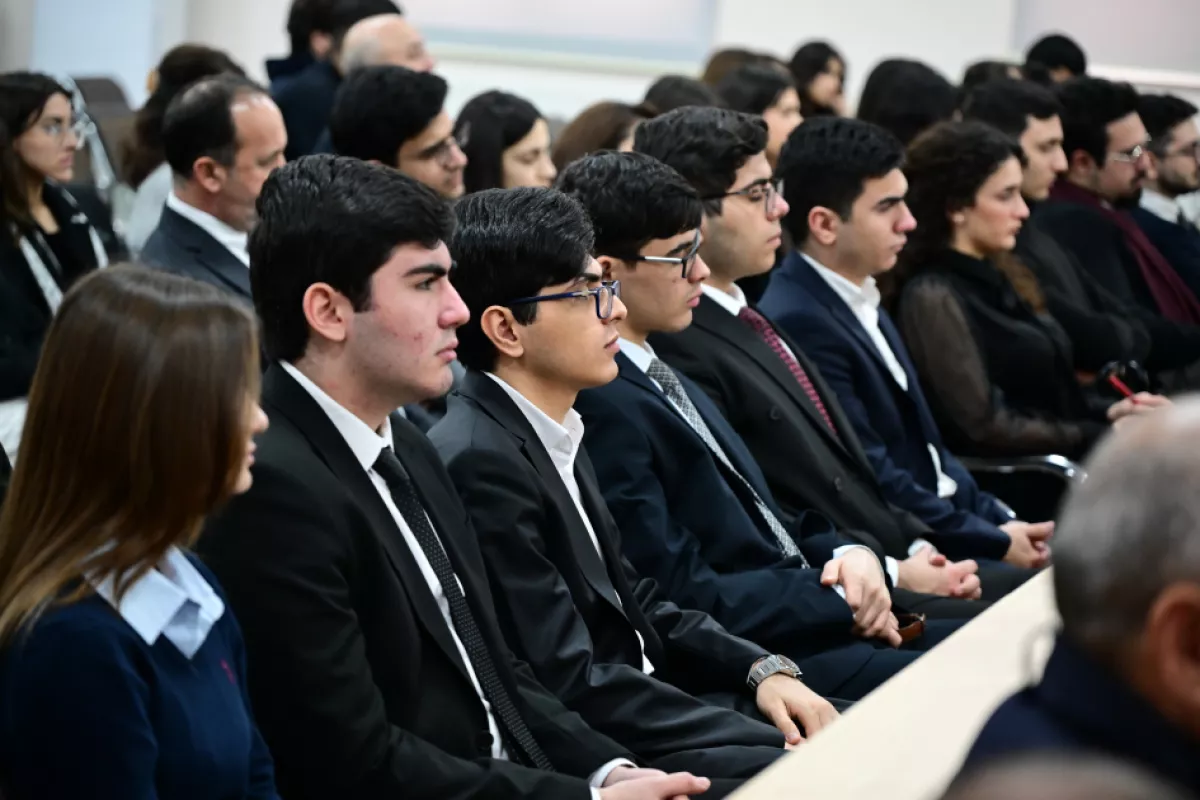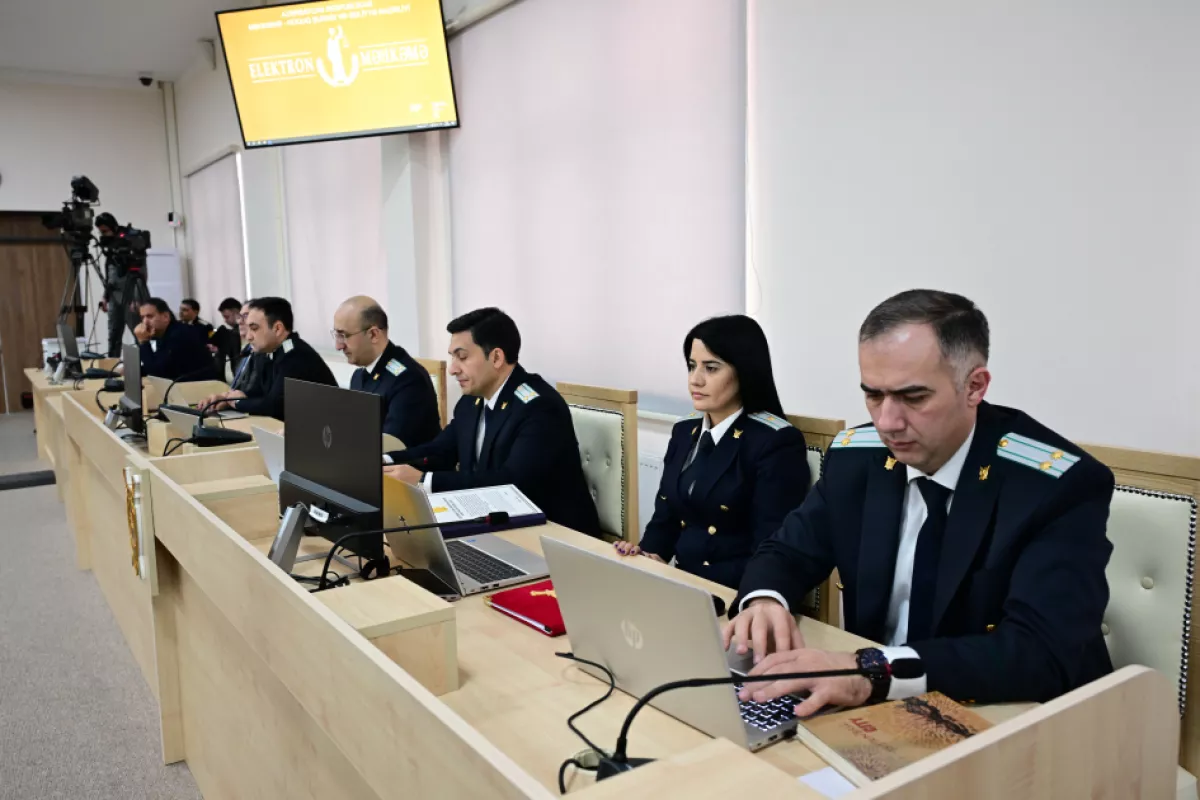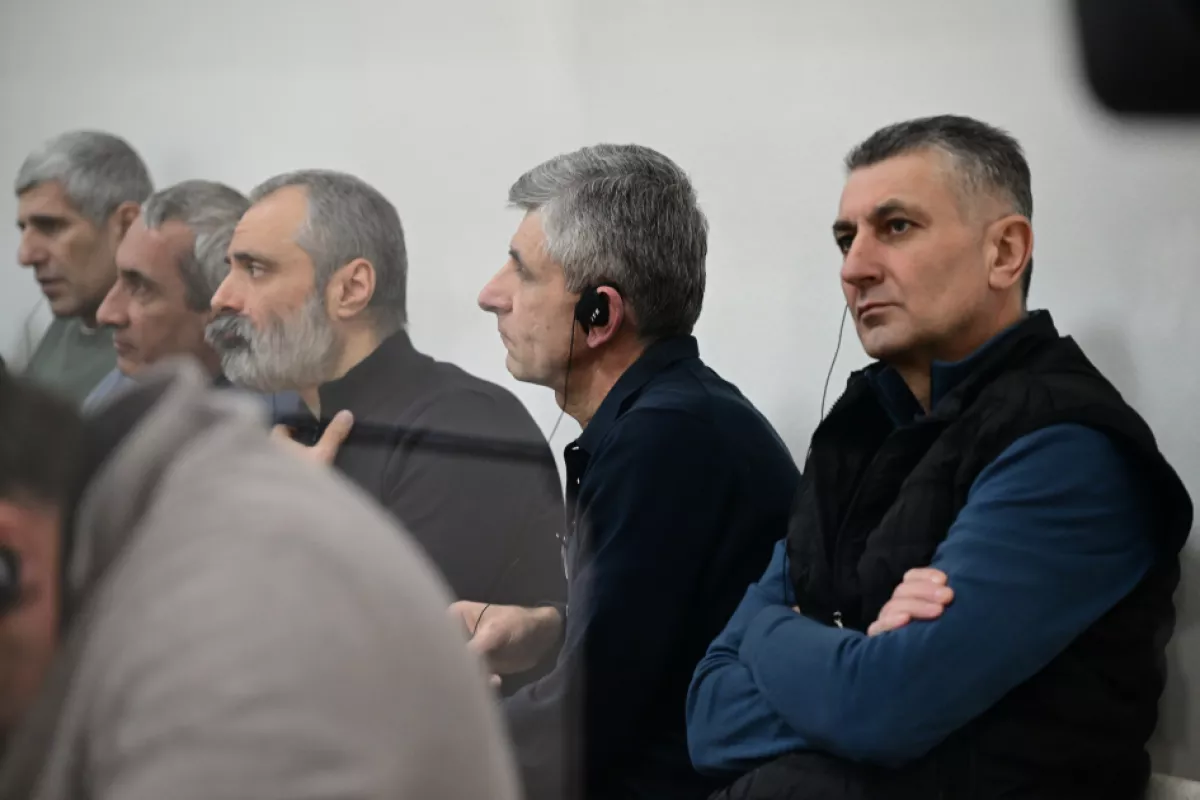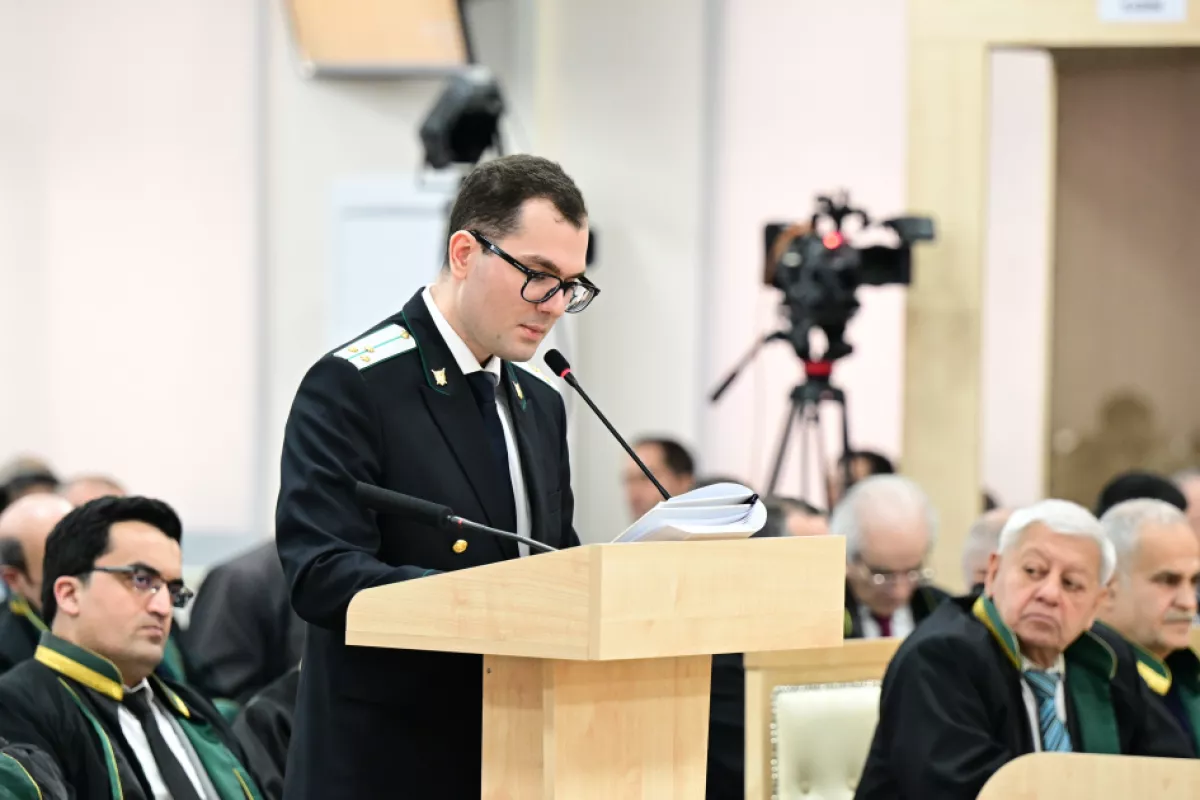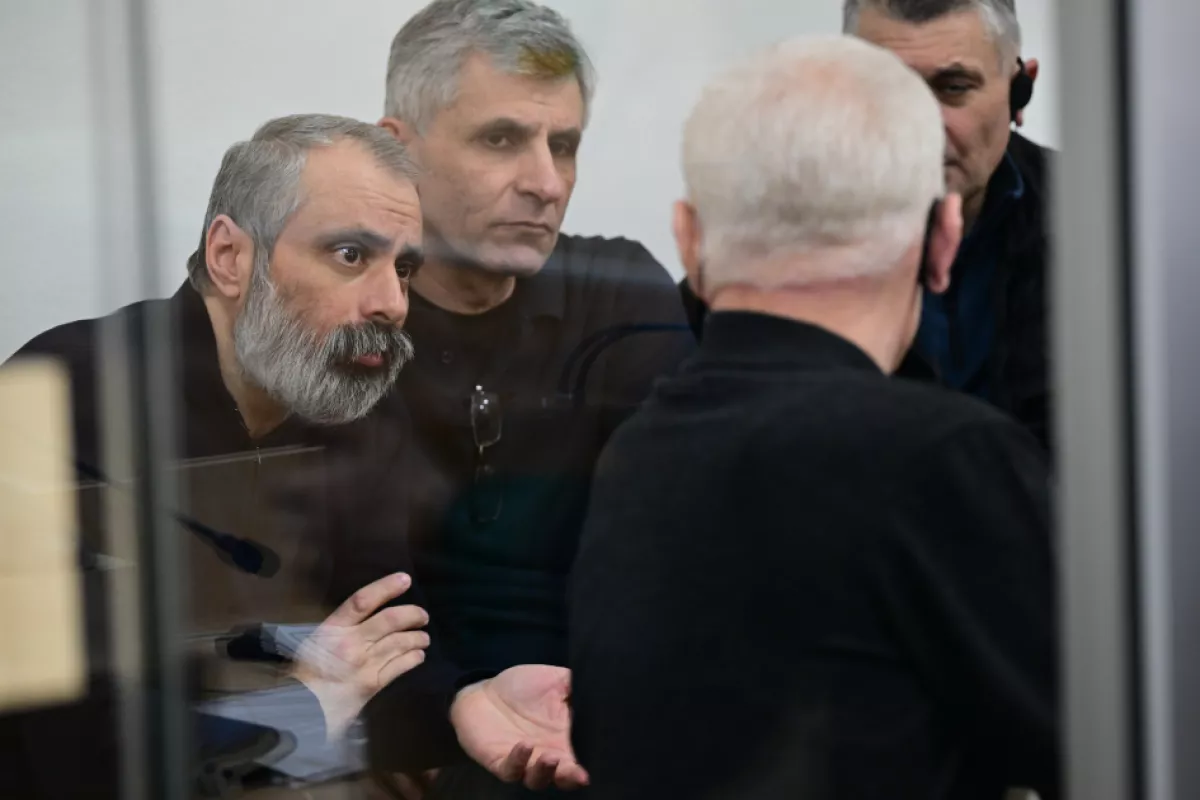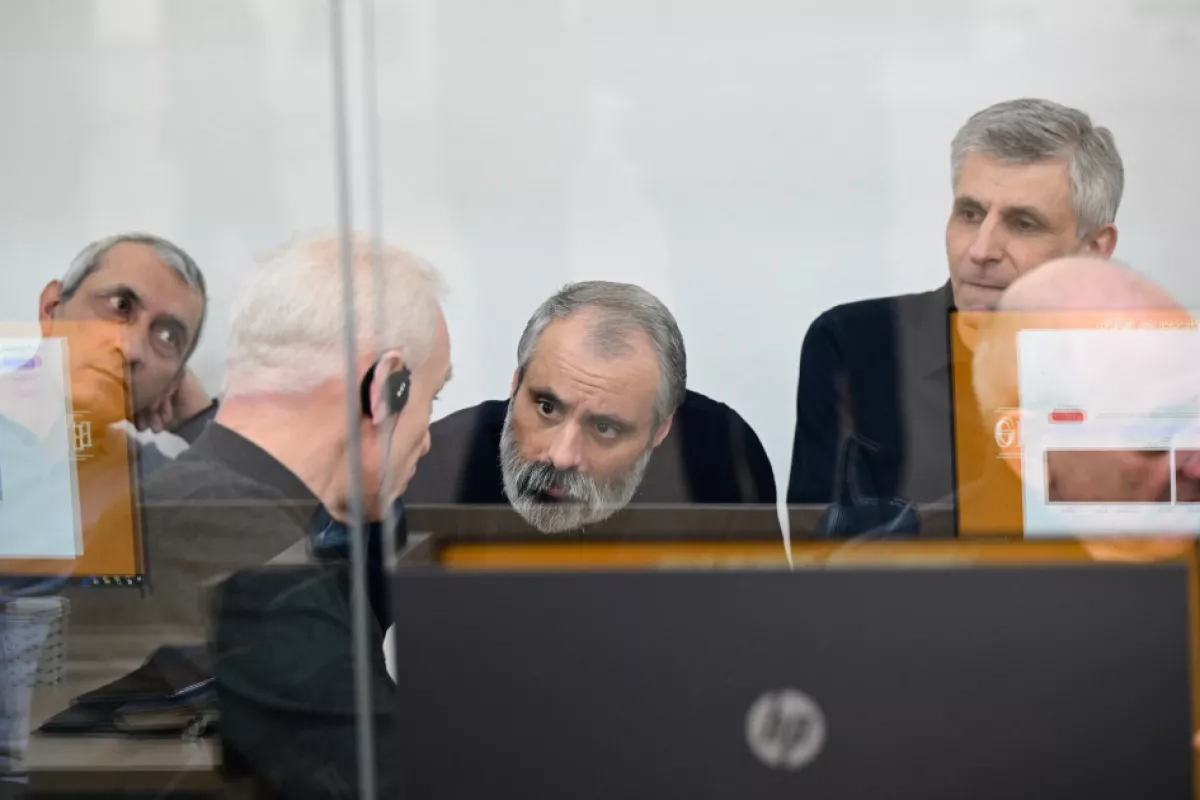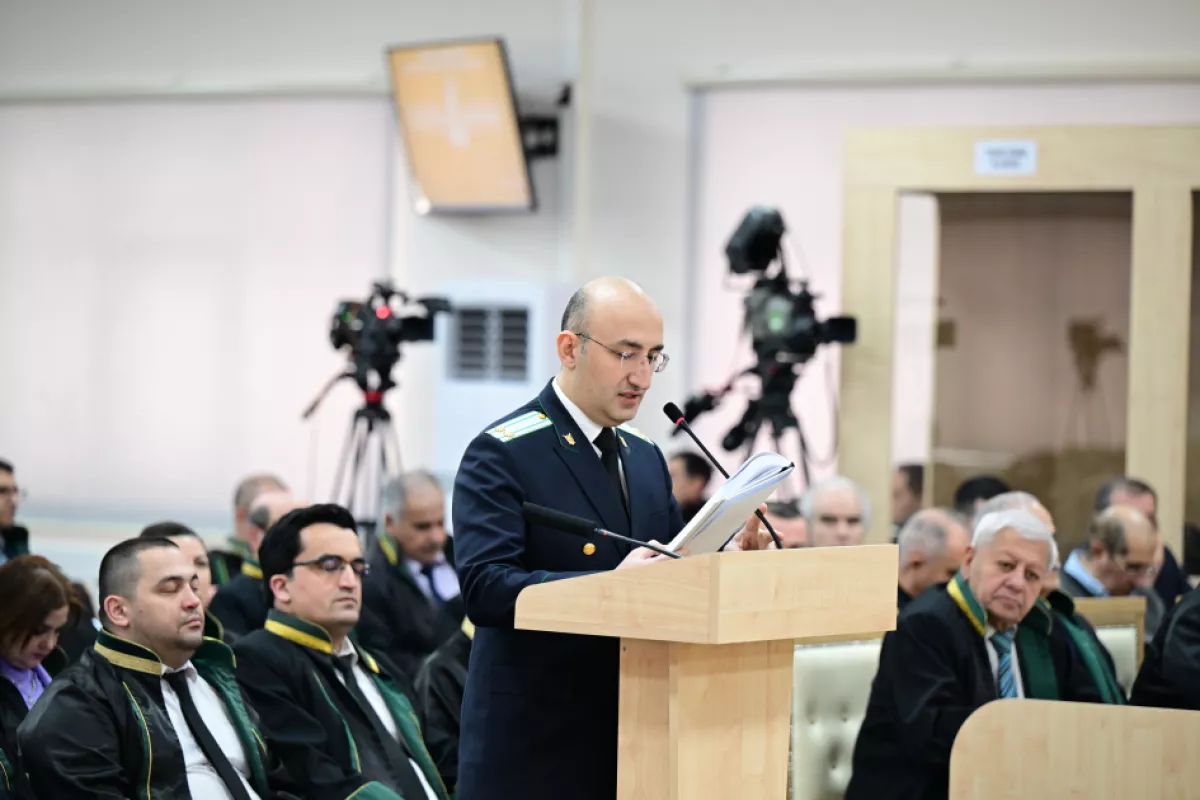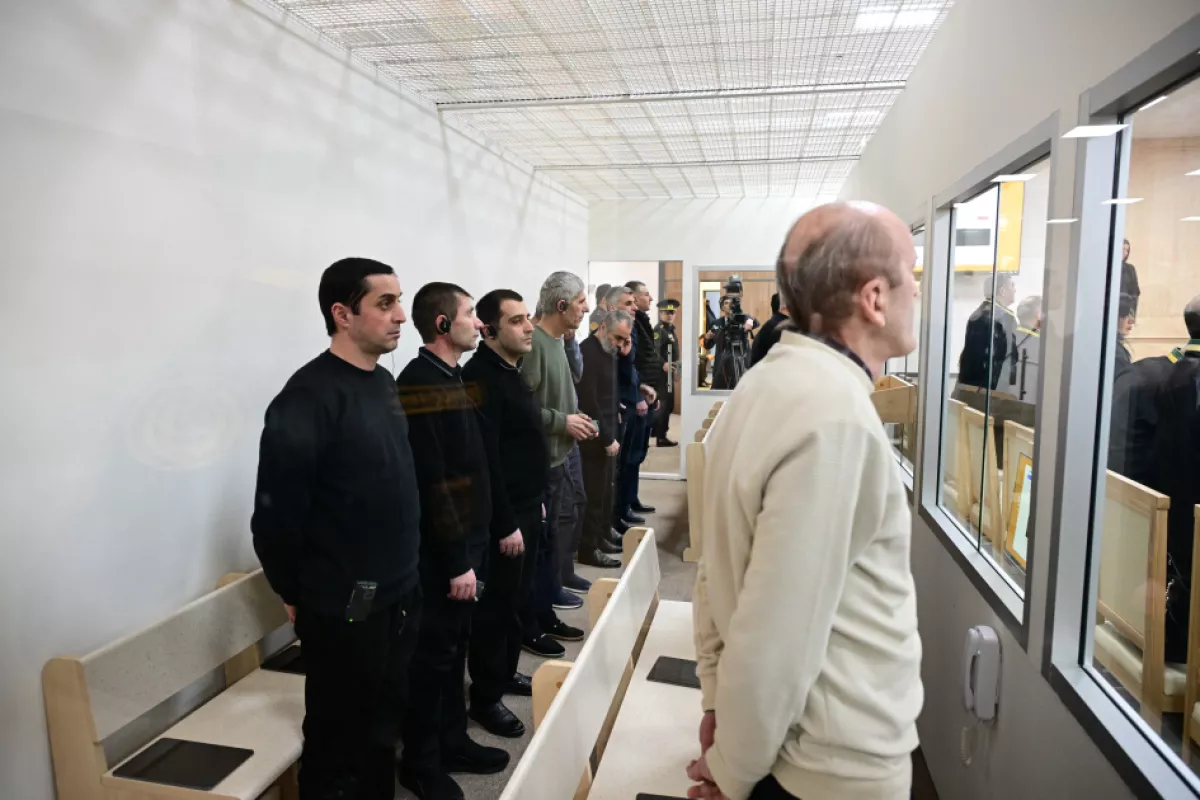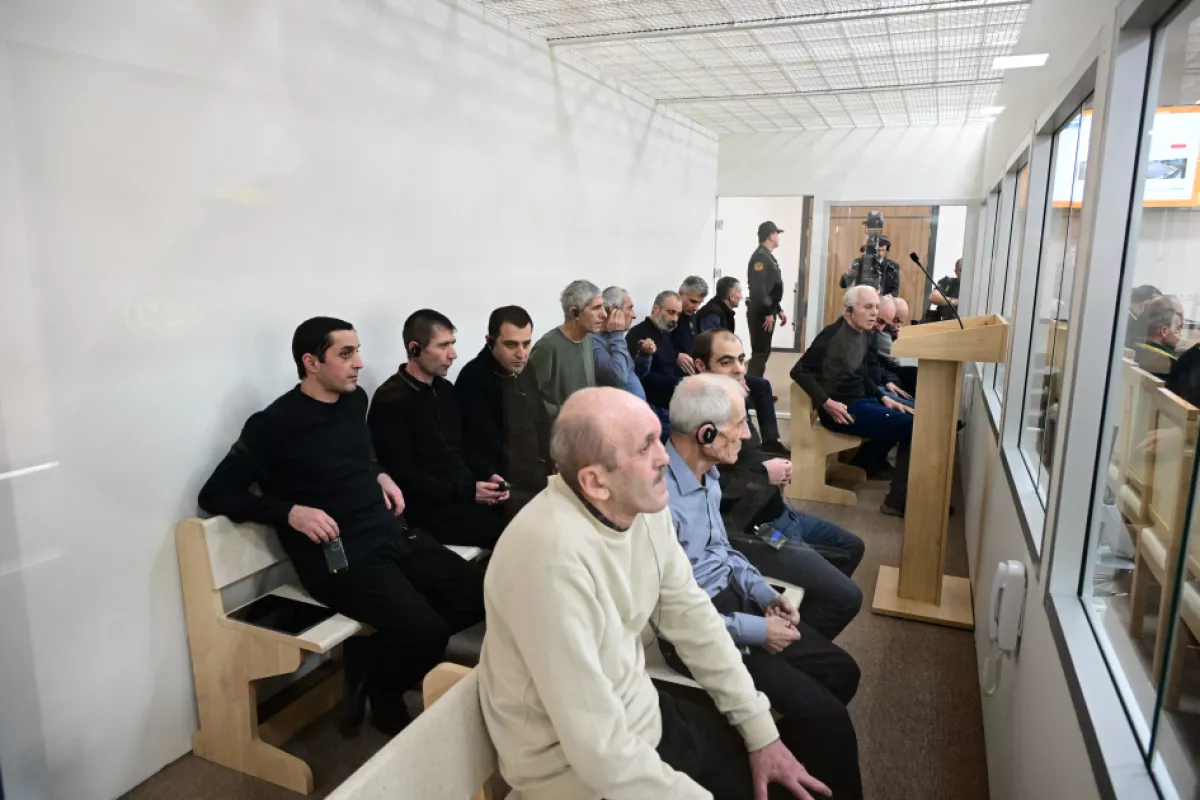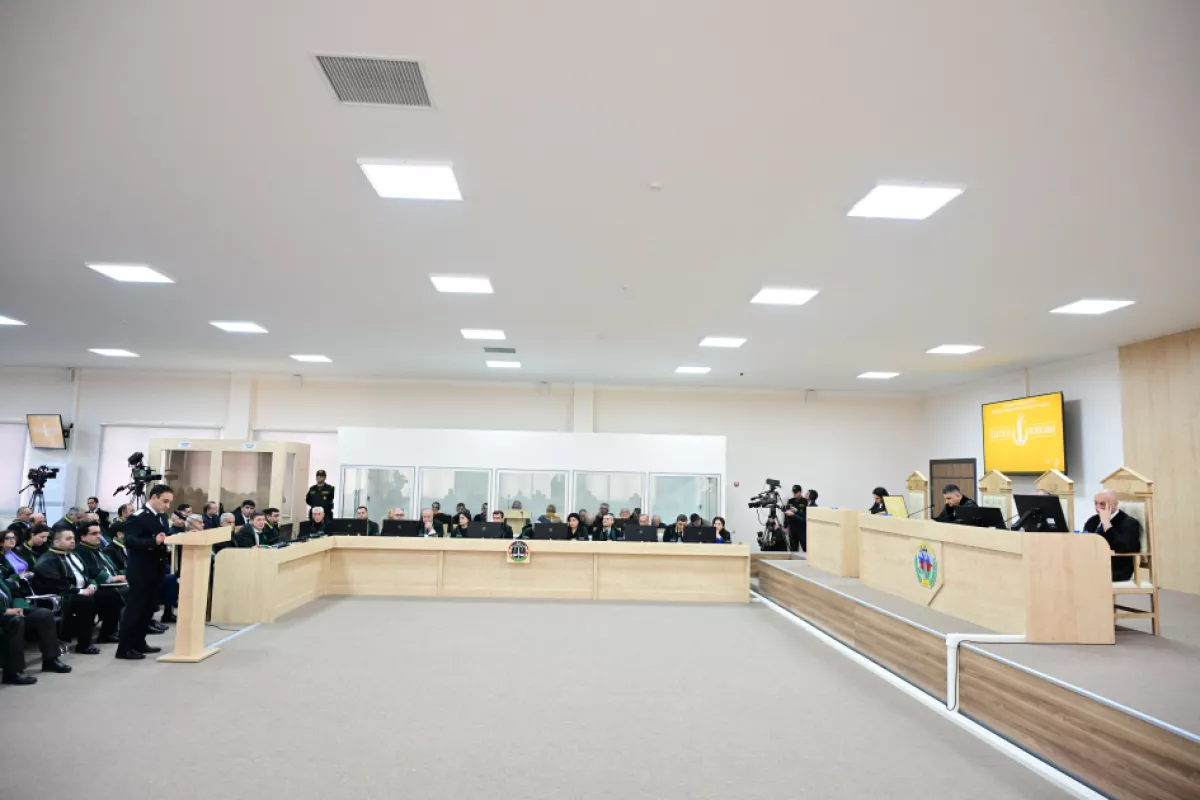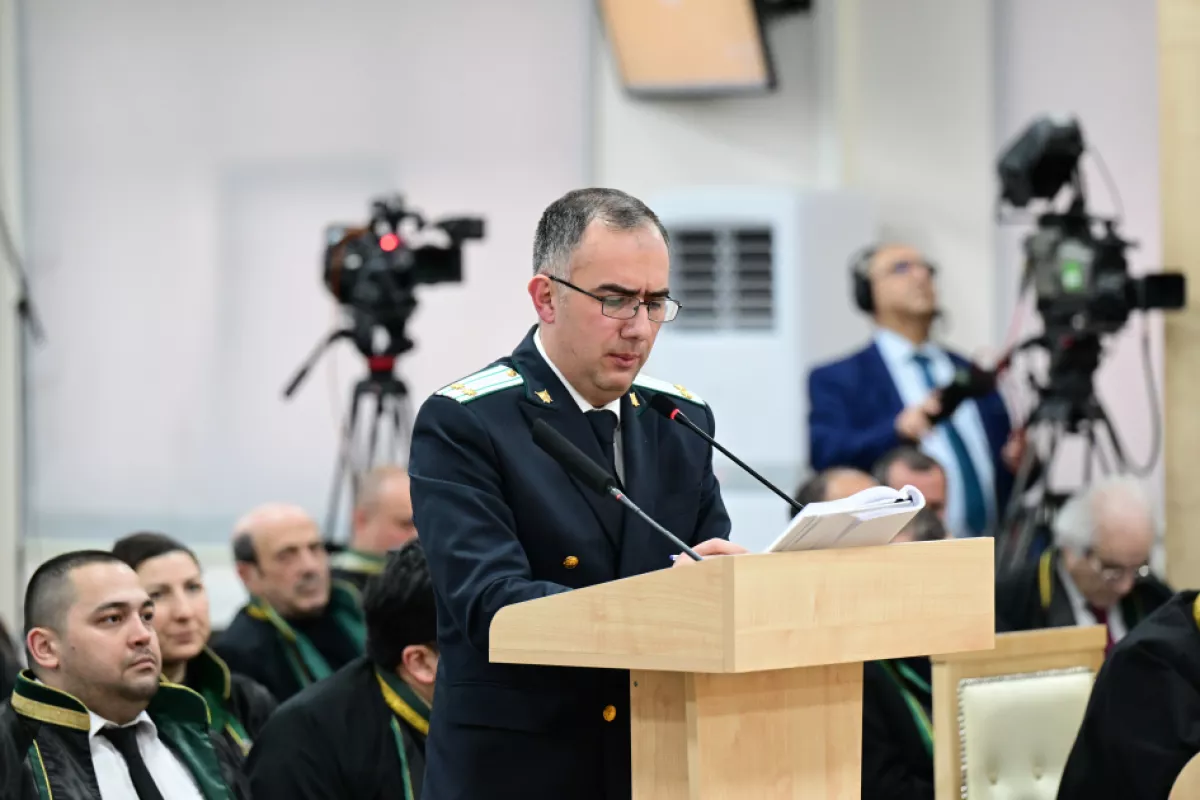Armenian war crimes suspects face charges in ongoing trial in Azerbaijan PHOTO
On February 11, court proceedings resumed in the case of Armenian citizens accused of crimes against peace and humanity, war crimes—including planning and waging an aggressive war—genocide, violations of the laws and customs of war, terrorism, financing of terrorism, violent seizure and retention of power, and other serious offenses linked to Armenia’s military aggression.
The trial involves key figures such as Arayik Harutyunyan, Arkadi Ghukasyan, Bako Sahakyan, Davit Ishkhanyan, Davit Babayan, Levon Mnatsakanyan, and others.
The proceedings are taking place at the Baku Military Court, located in the Baku Court Complex, under the chairmanship of Judge Zeynal Aghayev, with Judges Jamal Ramazanov and Anar Rzayev (reserve judge Gunel Samadova) presiding. Each defendant has been provided with an interpreter in their native language and legal representation for their defense, Caliber.Az reports via Azertag.
The court hearing was attended by some of the victims, their legal heirs and representatives, prosecutors from the state prosecution, as well as Rufat Mammadov, Head of the Cabinet of Ministers' Office, as the victim on behalf of the Azerbaijani state.
The trial continued with the announcement of the concluding part of the indictment by the prosecutors representing the state prosecution.
At this court session, the episodes related to the military aggression against Azerbaijan, carried out by the Armenian state, its officials, armed forces, and illegal armed groups under their direct leadership and involvement, were presented. This included written and oral instructions, orders, and guidance, as well as the material, technical, and personnel support provided, all of which were under centralized management and strict oversight. These actions, aimed at military aggression against Azerbaijan, were conducted in violation of both domestic and international legal norms.
The criminal acts were carried out under the leadership and direct or indirect involvement of individuals such as Robert Sedraki Kocharyan, Serzh Azati Sargsyan, Vazgen Mikayeli Manukyan, Vazgen Zaveni Sargsyan, Samvel Andraniki Babayan, Vitali Mikayeli Balasanyan, Zori Hayki Balayan, Seyran Musheghi Ohanyan, Arshavir Surenovich Karamyan, Monte Charles Melkonian and others. The episodes also included the extermination of the Azerbaijani population and acts of terrorism during the course of the aggressive war waged by the Armenian state and the aforementioned criminal group.
Tugay Rahimli, the Assistant to the Prosecutor General for Special Tasks, began the announcement of the section of the indictment concerning the extermination of the population during the course of the aggressive war.
It was stated that during the course of the aggressive war, under the direct control of the Armenian state and in accordance with its orders, instructions, and guidance, the criminal group conducted large-scale and systematic attacks aimed at forcibly displacing Azerbaijanis from their legally settled areas in the villages of Baghanis-Ayrim (Qazakh district), Malibayli-Qushchular (Shusha district), Qaradaghli (Khojavand district), Bash Guney (Aghdara district), Balligaya and Gulustan (Goranboy district), Aghdaban, Jomard, and Bashlibel (Kalbajar district). The aim of these attacks was to facilitate the easier occupation of these territories by Armenia. In the process, 241 people were deliberately killed by shooting, burning alive, and inflicting severe bodily injuries. Additionally, 149 individuals were severely injured with varying degrees of bodily harm, and there were attempts to deliberately kill them.
Following this, the section of the indictment concerning the acts of terrorism committed during the course of the aggressive war was announced.
The Deputy Prosecutor General, Vusal Aliyev, stated that between 1988 and 2023, a total of 308 episodes of terrorism were committed, resulting in the deliberate killing of at least 210 military personnel and 239 civilians, making a total of 449 victims. Additionally, 1,013 military personnel and 716 civilians—1,729 individuals in total—were targeted with attempts to deliberately kill them.
In total, as a result of terrorism-related crimes, 17 children were deliberately killed, and there were attempts to deliberately kill 53 children by inflicting varying degrees of bodily harm.
Subsequently, state prosecutors Fuad Musayev, Vusal Abdullayev, and Tarana Mammadova announced specific episodes related to the terrorism crimes.
It was also noted that on January 9, 1991, a UAZ-469 vehicle traveling in the direction of the Shusha district was fired upon, resulting in the deliberate killing of four individuals. The victims included the driver, Goyek Ivan Ivanovich, and three passengers: Colonel-Lieutenant Oleg Mikhailovich Larionov, commander of the reconnaissance regiment of Soviet military unit No. 44682; Major Igor Yuryevich Ivanov, chief of staff of the Lachin military commandant’s office; and Salatin Aziz gizi Asgarova, a journalist from the Molodyozh Azerbaydjana newspaper, who was on assignment in the area. They all sustained fatal gunshot wounds and various bodily injuries.
Additionally, it was reported that on November 20, 1991, a helicopter carrying representatives of the Azerbaijani government, as well as observers from the Russian Federation and the Republic of Kazakhstan, was attacked while preparing to land in the Khojavand district. As the helicopter flew at a low altitude over the Garakand village area, members of the criminal organization, having received information about its approach, launched an intense attack using AK-74 machine guns and automatic rifles. They fired from an estimated 30-degree angle at a distance of 300 meters, severely damaging the helicopter and causing it to lose control.
As a result, the helicopter, which crashed and exploded upon hitting the ground, was burned. The crash occurred 5 kilometers east of the Garakand village, on the northern slope of the mountain, perpendicular to the rural dirt road. Among the victims were several high-ranking Azerbaijani officials, including Ismat Ismayil oglu Qayibov, former Prosecutor General of Azerbaijan, Mahammad Nabi oglu Asadov, Minister of Internal Affairs of Azerbaijan, Tofig Kazim oglu Ismayilov, State Secretary of Azerbaijan, Zulfu Saleh oglu Hajiyev, Deputy Prime Minister of Azerbaijan, Vagif Jafar oglu Jafarov, Member of the Milli Majlis of Azerbaijan, and Vali Huseyn oglu Mammadov, another Member of the Milli Majlis.
Other victims included Sanlal Dosumovich Serikov, Deputy Minister of Internal Affairs of Kazakhstan, Ali Mustafa oglu Mustafayev, a television journalist, Fakhraddin Ibrahim oglu Shahbazov, a video operator, Arif Ismayil oglu Huseynzade, a lighting operator, Gurban Huseyn oglu Namazaliyev, First Deputy Minister of Melioration and Water Economy of Azerbaijan, Osman Mirzahuseyn oglu Mirzayev, Department Head in the Presidential Administration of Azerbaijan, Rafiq Mammad oglu Mammadov, Assistant to the State Secretary of Azerbaijan, Nikolay Vladimirovich Jinkin, Commandant of the Emergency Situation District, Mikhail Dmitriyevich Lukashov, Major General of the Militia, Oleg Nikolayevich Kocherov, Lieutenant Colonel, as well as Sergey Semyonovich Ivanov, Head of the National Security Department of Nagorno-Karabakh, Igor Aleksandrovich Plavskin, Prosecutor of the Nagorno-Karabakh Autonomous Region, and Vladimir Vladimirovich Kovalyov, Head of the Internal Affairs Department of Nagorno-Karabakh.
Furthermore, the three members of the helicopter crew—Vyacheslav Vladimirovich Kotov, Gennadi Vladimirovich Dolgov, and Dmitri Borisovich Yarovenko—suffered severe bodily injuries. In total, 22 individuals performing official duties were deliberately killed.
The statement also highlighted that on January 26, 2010, in the Ashaghi Abdurrahmanli village of Fuzuli district, an “UAZ” vehicle belonging to the Fuzuli Military Prosecutor’s Office, bearing the license plate 00-21 HP, was attacked with automatic weapons. As a result, Araz Gabil oglu Hidayatov, an investigator of the Fuzuli Military Prosecutor’s Office, suffered a gunshot wound while performing his official duties.
Additionally, it was announced that members of the criminal group had planted an explosive device inside a white, dog-shaped toy and thrown it into the Tovuz River. On July 14, 2011, near the Alibayli village of Tovuz district, which borders Armenia, Aygun Ziraddin gizi Shahmaliyeva (born September 15, 1999) found the toy while playing by the river. Curious about the object, she took it home and placed it on a table, triggering a deadly explosion upon physical contact. The blast scattered shrapnel, causing Aygun’s immediate death at the scene.
Following this, state prosecutor Tarana Mammadova began announcing charges related to terrorist crimes committed during the April 2016 clashes, the July 2020 Tovuz battles, and the Second Karabakh War of 2020.
It was reported that during April 2-6, 24, 26-28, and 30, 2016, heavy-caliber and other firearms were used to deliberately target civilians in several Azerbaijani regions: in Aghdam district, 3 civilians were killed and 13 others were injured to varying degrees; in Tartar district, 3 civilians were killed and 11 others were injured; in Goranboy district, 4 civilians sustained various injuries; in Fuzuli district, 1 civilian was injured; in Aghjabadi district, 1 civilian was injured. In total, 6 civilians were deliberately killed, while 30 others suffered injuries in attempted killings. Additionally, 733 immovable properties were completely or partially destroyed, burned, or damaged, causing over 2.4 million manats ($1.4 million) in material damage.
It was noted that during July 12-16, 17, 24, and 25, 2020, in the next phase of the aggressive war carried out with a unified intent, heavy-caliber and other firearms were used to deliberately kill 1 civilian in the village of Aghdam, Tovuz district. Additionally, significant material damage exceeding 594,000 manats ($350,000) was inflicted on the private homes and properties of 69 civilians, including 11 residents of Aghdam village, 35 from Dondar Qushchu, 4 from Alibayli, 4 from Yukhari Oysuzlu, 8 from Vahidli, 1 from Ashaghi Oysuzlu in Tovuz district, and 6 from Khanliglar village in Gazakh district.
It was specifically emphasized that from October 4 to 17, 2020, using the Smerch multiple-launch rocket system, which was transported from Armenia and installed in engineering-fortification positions in the occupied territories of Azerbaijan, as well as the 9K72 Elbrus operational-tactical missile system positioned along the conditional contact line on Armenian territory, intensive and continuous strikes were carried out on the city of Ganja. As a result of these missile explosions, a total of 26 civilians were deliberately killed, and 175 civilians sustained various degrees of injuries.
Additionally, from October 5 to November 7, 2020, Grad and Smerch multiple-launch rocket systems, Cluster-type ballistic missiles, mortars, and other heavy-caliber weapons were used in targeted attacks on Barda district, resulting in the deliberate killing of 29 civilians and injuries of 103 others.
During the 44-day Patriotic War, a total of over 187 million manats ($110 million) in material damage was inflicted on state and private movable and immovable property across Ganja and Mingachevir cities, as well as the districts of Tartar, Aghdam, Barda, Aghjabadi, Fuzuli, Goranboy (Naftalan), Beylagan, Jabrayil, Kurdamir, and Gabala.
Additionally, 25 incidents were reported, including attacks on helicopters conducting rescue flights for stranded individuals in Shusha city, Garadaghly village of Khojavend district, Khojaly district, and other areas. These attacks involved gunfire from various weapons, causing injuries to pilots and passengers as well as damage to the helicopters. There were also attempts to sabotage the Baku-Tbilisi-Ceyhan Oil Pipeline and the Western Export Pipeline in the Goranboy and Yevlakh districts, among other terrorist acts.
The trial will continue on February 14.
To recap, 15 individuals—Arayik Vladimiri Harutyunyan, Arkadi Arshaviri Ghukasyan, Bako Sahaki Sahakyan, Davit Rubeni Ishkhanyan, David Azatini Manukyan, Davit Klimi Babayan, Levon Henrikovich Mnatsakanyan, Vasili Ivani Beglaryan, Erik Roberti Ghazaryan, Davit Nelsoni Allahverdiyan, Gurgen Homeri Stepanyan, Levon Romiki Balayan, Madat Arakelovich Babayan, Garik Grigori Martirosyan, Melikset Vladimiri Pashayan—have been charged under multiple articles of the Criminal Code of Azerbaijan, including Article 100 (aggressive war planning and execution), Article 102 (attacks on internationally protected persons or entities), Article 103 (genocide), Article 105 (extermination of a population), Article 106 (slavery), Article 107 (deportation or forcible displacement), Article 109 (persecution), Article 110 (enforced disappearance), Article 112 (unlawful deprivation of liberty), Article 113 (torture), Article 114 (mercenarism), Article 115 (war crimes), Article 116 (violations of international humanitarian law), Article 118 (war looting), Article 120 (premeditated murder), Article 192 (illegal business activities), Article 214 (terrorism), Article 214-1 (terrorism financing), Article 218 (criminal organization formation), Article 228 (illegal possession and transportation of weapons and explosives), Article 270-1 (threats to aviation security), Article 277 (assassination of state or public figures), Article 278 (violent seizure of power and forced constitutional change), and Article 279 (unauthorized armed group formation), along with other legal provisions.
By Vugar Khalilov




